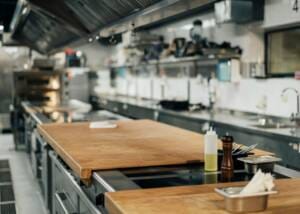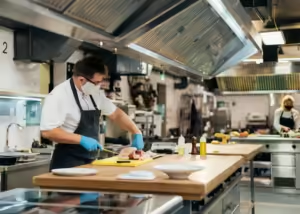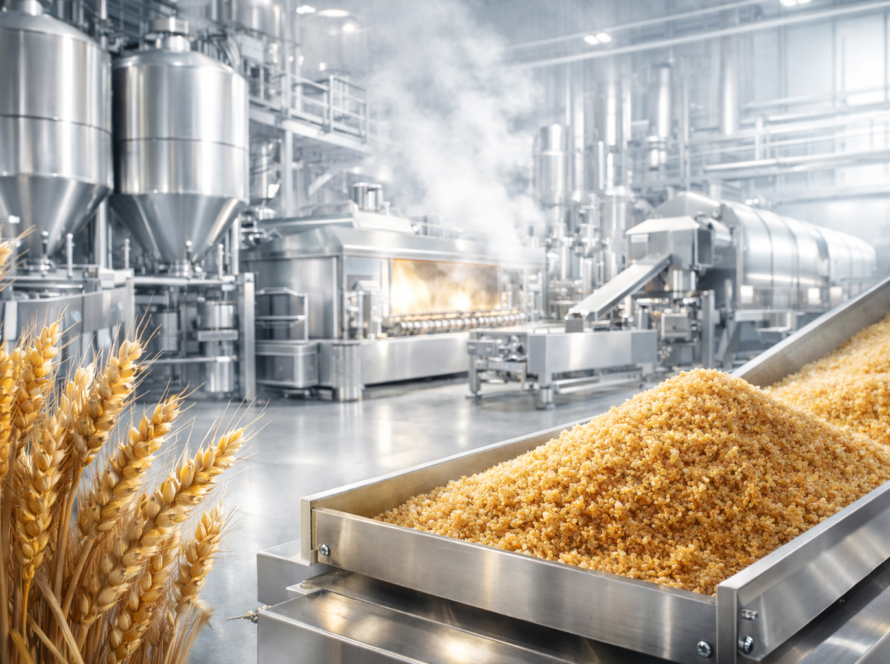
A central kitchen project is one of the most effective solutions for the hospitality sector, whether it is restaurants, hospitals or hotels. The central kitchen plays a vital role in improving efficiency, controlling costs, and ensuring high quality food.
With the increasing demand for large and diverse food services, establishing a central kitchen project is a necessary strategic step to improve productivity and provide distinguished food services
What is a central kitchen?
A central kitchen is a specialized facility where food is prepared in large quantities for distribution to various branches or related departments such as restaurants, hospitals or hotels. This kitchen is designed to focus on large-scale production, while maintaining high quality and serving food quickly and efficiently. In a central kitchen project, ingredients and food materials are pre-prepared in a way that saves time and effort for the various branches.
Benefits of establishing a central kitchen
1-Improving operational efficiency
A central kitchen project contributes to improving operational efficiency by unifying food preparation processes. Food can be prepared in one place and distributed to several branches, reducing the need to establish complete kitchens in each branch. This process saves time and reduces waste of materials.
2-Cost Control
A central kitchen allows for bulk purchases of food, which reduces purchasing costs. Also, standardizing the food preparation process helps reduce the need for large labor in each branch, which contributes to lower wage costs.
3-Ensuring Quality and Continuity
A central kitchen project enables high quality standards to be maintained across all branches. Preparation processes are closely monitored, ensuring that food is served at the same level of quality every time.
4-Reducing Waste
Since all preparation processes are done in one place, it becomes easy to monitor the amount of materials used and thus reduce waste. This feature helps reduce costs and increase efficiency.
Challenges Facing the Central Kitchen Project
1-Large Infrastructure
A central kitchen project requires a large area and appropriate infrastructure, including advanced ventilation systems and large and multiple cooking equipment.
2-Transportation and Distribution Management
One of the main challenges is how to distribute food quickly and efficiently to different branches. This requires strong logistics management to ensure that food arrives on time and at the highest quality.
3-Maintaining Food Safety Standards
A central kitchen project must strictly adhere to food safety standards. This requires effective systems to monitor hygiene, quality of ingredients, and food storage at appropriate temperatures.
Effective Central Kitchen Design
1-Good Space Planning
The design should include a thoughtful layout of the space so that preparation, cooking, and storage areas are separated. There should also be sufficient space to store raw materials and tools.
2-Using Modern Technology
Using technological systems such as kitchen management systems and tracking systems helps improve efficiency and production control. These systems help reduce errors and facilitate tracking of inventory and orders.
3-Choosing the right equipment
Choosing equipment is one of the most important steps for the success of a central kitchen project. The equipment must be of high quality and fit the needs of large production. Examples of this equipment include: large ovens, steamers, and large-scale vegetable cutting machines.
The role of the central kitchen in hospitals and hotels
Central kitchen in hospitals
The central kitchen in hospitals is an essential part of providing nutritional care to patients. The central kitchen provides the ability to prepare meals in large quantities, taking into account the different nutritional needs of each patient. This contributes to providing healthy meals quickly and accurately while ensuring quality.
Central kitchen in hotels
In large hotels, a central kitchen project can help provide a variety of services to guests and ensure timely food delivery, whether in the hotel’s restaurants or in room service. The central kitchen contributes to enhancing the ability to provide distinguished and high-quality foods on various occasions such as conferences and banquets.
Key Factors for the Success of a Central Kitchen Project
1-Good Staff Training
Good training plays an important role in the success of a central kitchen project. Chefs and workers must be trained on how to handle large equipment and adhere to safety and quality standards.
2-Adherence to food safety standards
A central kitchen must adhere to the highest food safety standards to ensure the provision of safe and healthy food. This requires regular inspections and comprehensive follow-up of preparation and storage processes.
3-Accurate Financial Planning
A central kitchen project requires careful financial planning to ensure a balance between costs and profits. Financial planning should include the costs of equipment, raw materials and labor.
The role of the central kitchen in reducing resource consumption
One of the main benefits of a central kitchen project is its ability to efficiently reduce resource consumption. By preparing large quantities of food in one location, water and electricity use can be reduced compared to preparing the same quantities in several separate locations. It also helps improve waste management, as the quantities used can be more accurately monitored and waste can be reduced. This efficiency in resource consumption contributes to reducing environmental and financial costs in the long run.
Supporting food diversity and innovation
A central kitchen project allows restaurants and hotels to offer a wide range of food options while maintaining efficiency. Central kitchens can prepare a variety of dishes to suit different tastes and diets, such as gluten-free foods, vegetarian dishes, or foods with special dietary needs. This diversity enhances the ability of restaurants and hotels to attract different types of customers and meet their expectations, which is an important element of success in a competitive market.
Increased flexibility and scalability
A central kitchen provides high flexibility in dealing with increased demand. Instead of increasing the number of chefs or creating new kitchens in each branch, production can simply be increased in the central kitchen. This system facilitates the process of expansion and opening new branches without the need to equip complete kitchens in each location. This flexibility provides the ability to respond quickly to market changes and increase production capacity in seasons of high demand.
Using technology in managing the central kitchen
Technology is an essential tool in operating a central kitchen project efficiently. Inventory and order management systems can be used to track food and ensure that it is available when needed. These systems also help reduce waste by monitoring the quantities of food prepared, which helps improve ordering processes and avoid waste. In addition, quality management systems can be used to ensure that the kitchen adheres to food safety and health standards.
Crisis management and resilience in dealing with challenges
The central kitchen plays a major role in providing flexible solutions to deal with crises such as natural disasters or logistical challenges. Thanks to the ability to prepare centrally, central kitchens can move quickly to provide food to affected branches or even provide services to hospitals and public facilities in times of emergency. This approach contributes to enhancing the flexibility of operations and ensuring the continuity of food services in difficult circumstances.
Collaboration with local suppliers
Collaboration with local suppliers is another element that helps enhance the effectiveness of a central kitchen project. By purchasing food from local sources, logistics costs can be reduced and the local economy strengthened. This collaboration also contributes to improving the sustainability of operations and ensuring the quality of the ingredients used in food preparation.
Establishing a central kitchen project represents a strategic opportunity to enhance operational efficiency and reduce costs in the hospitality sector, whether in restaurants, hospitals or hotels. The central kitchen provides advanced solutions to improve food quality, reduce waste and ensure the provision of integrated food services.
In this context, ProNano Food Industry Consulting provides specialized consulting services to help establish and operate central kitchens effectively. Those wishing to implement this project can benefit from the company’s experience to achieve success in this field and ensure smooth operation and high efficiency. For more information, you can contact the company to receive a customized consultation.
Read more about establishing a bakery factory



